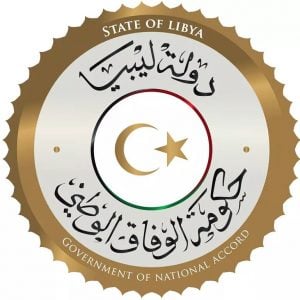By Sami Zaptia.

London, 29 December 2019:
The internationally recognized Libyan government based in Tripoli and led by Faiez Serraj has denied the presence of any Syrian fighters taking part on its side in the Tripoli fighting. This comes ahead of the planned meeting between Turkey’s Erdogan and Russia’s Putin to discuss the Libya question.
The statement comes as the fighting, which was launched by Khalifa Hafter back in April, and airstrikes continue on the outskirts of Tripoli with both sides claiming successes. What is clear, as confirmed by UNSMIL’s condemnation, is that civilians seem to be bearing the brunt of the fighting.
The denial comes after videos were circulated on social media purporting to show Syrian fighters taking part in the fighting against the Hafter-led Libyan National Army and its allies on the outskirts of Tripoli.
The pro-Hafter media alleged that these fighters were Turkish aligned militias transported by Turkey from Syria to Libya to help the forces defending Tripoli. They claimed this was part of the effort by Turkey to support the Tripoli Faiez Serraj government.
Libya-Turkey agreement
This comes on the back of the agreement between the Tripoli government and the Turkish government permitting the later to send troops to Libya to help the Tripoli government. This, in turn, was in response to allegations that the Hafter forces were backed by Russian fighters from the Wagner Group and various sub-Saharan mercenaries reported at over 2,000 strong.
It will be recalled that on 19 December, the Tripoli Government of National Accord (GNA) announced that it had activated the 27 November military agreement with Turkey under which the Turks are to provide military support to it. The Turkish parliament ratified the agreement on 21 December.
On 10 December Turkey’s President Recep Tayyip Erdogan had said that Turkish troops would be sent if the GNA were to request it. On 26 December, Erdogan appear to claim that the GNA had now requested troops and that they would go in early January after a bill was put to the Turkish parliament for approval.
That would be around 8 January, the same day that Russian President Putin is due in Turkey for talks on Libya.
However, speaking in Tunis also on 26 December, GNA Interior Minister Fathi Bashagha said that no GNA request had been made as yet. He also said that an official request for military support would be made if the situation escalated.
There is now much anticipation of Erdogan-Putin meeting and a possible confrontation between Turkish troops and the Russians employed by the Wagner Group fighting in the Tripoli offensive for the LNA.
There is speculation as to whether Turkey and Russia would come to a deal to prevent their forces fighting each other in Tripoli as they had done in Syria. Equally, there is speculation that Russia will sacrifice Hafter in return for prioritizing higher strategic geopolitical interests with Turkey.
Greek reaction
Greek anger at the GNA’s recognition of Turkey’s eastern Mediterranean Exclusive Economic Zone (EEZ) has seen Athens effectively breaking ties with the GNA and instead stepping up its ties with Hafter’s LNA and the allied eastern House of Representatives (HoR) and the eastern-based Interim Government of Abdullah Thinni.
On 22 December, after Greece had earlier expelled the GNA’s ambassador in Athens, Greek Foreign Minister Nikos Dendias had talks in Benghazi, with Haftar. Also at the meeting was Christodoulos Lazaris who was appointed as Greece’s Special Envoy for Libya during the visit to Athens on 12 December by the HoR’s president, Ageela Saleh.
According to LNA reports, at the Benghazi meeting Haftar proposed a Greek-Egyptian-LNA naval alliance in the eastern Mediterranean against Turkey. According to the same reports, Athens and Cairo agreed to this.
So far there has been no confirmation from Cairo or Athens. After his meeting in Benghazi, Dendias flew to Cairo for further talks on Libya with the Egyptian foreign minister, then on to Cyprus for talks there.
Meanwhile, the Thinni government’s foreign minister, Abdelhady Alhweij, has claimed that Athens now accepts his government is the sole legitimate one. So far, there has been no statement to that effect from Athens; but in reality, that seems to be the case.
Dendias’ Benghazi visit has been condemned by the GNA as a violation of a UN resolutions recognising it as Libya’s sole government.
Regional escalation
The prospect of the Libyan conflict going regional is taking a step closer to reality.
While Haftar talks of an LNA-Egyptian-Greek naval alliance, in Tunis on 26 December, Bashagha said that a coalition of Libya, Turkey, Algeria and Tunisia had been formed.
The Tunisian authorities subsequently denied this. Nonetheless, it needs to be remembered that Tunisia has traditionally worked with whoever is in power in Tripoli.
The reasons were pragmatic. Tunisia needs to keep good relations with whoever is in power to its immediate east. There are economic reasons too: a significant amount of Tunisian exports go to western Libya.
Bashagha’s statement should be seen as reflecting a new political reality. It came after the Turkish President made an unexpected visit to Tunis on 25 December for talks with Saied and other Tunisia officials both on Libya and closer Turkish-Tunisian ties. Erdogan said he discussed a possible ceasefire in Libya with Saied.
https://www.libyaherald.com/2019/12/29/unsmil-condemns-repeated-airstrikes-on-civilian-targets-in-western-libya/
https://www.libyaherald.com/2019/12/17/turkey-eases-visa-requirements-for-libyans-seen-as-part-of-recent-wider-cooperation/






